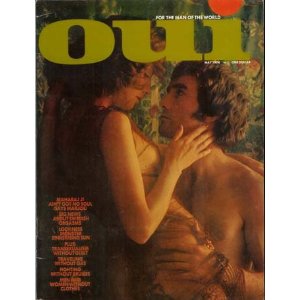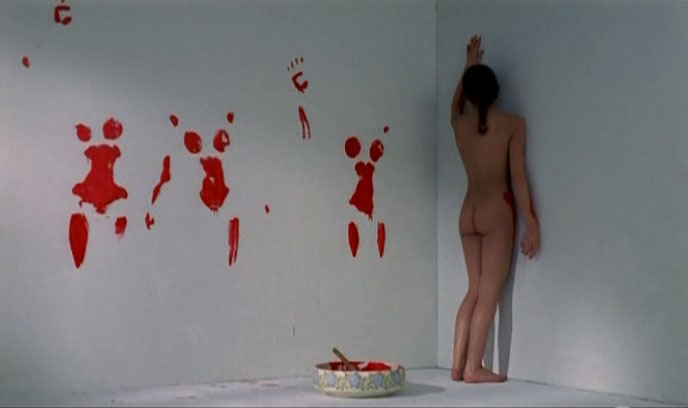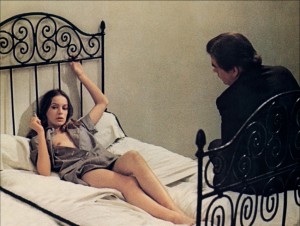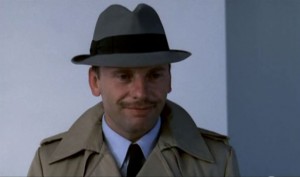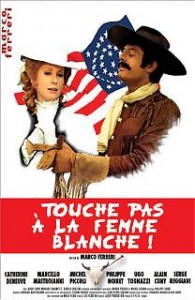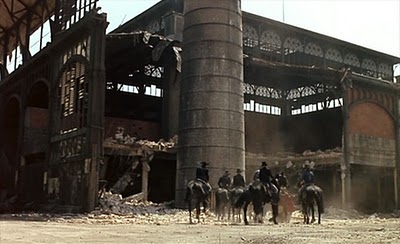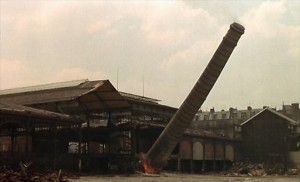I suspect that the easiest money I’ve ever made in my
entire life as a writer was the year I mainly supported
myself, 1974-75, during my fifth and final year of living
in Paris, by writing capsule film reviews for a monthly
magazine in English called Oui — a joint publishing
effort of Hugh Hefner in Chicago and Daniel Fillipachi
(the publisher of Lui and, for a long stretch in the 1960s,
Cahiers du Cinéma) in Paris. At a time when I was struggling
to make ends meet -– my inheritance money having run
out, and my other freelance jobs being few and far
between -– my life was virtually saved by Terry Curtis Fox,
a Chicago-based associate editor of Oui, who engaged
me to write reviews for the magazine on a regular basis.
If memory serves, this paid $50 a review (a fortune
at the time), and I could pretty much select which films
I wrote about as long as the two-page section of the magazine
called “Prevue” could meet its monthly “tits and ass”
quotient with its illustrations, which the magazine gathered
on its own. So I wound up writing about the latest films of
Jacques Rivette, Robert Bresson, Carmelo Bene, Maurice
Pialat, Alain Resnais, and everything else I could find that
interested me, usually averaging two or three reviews per
issue, starting off with the latest films of Alain Robbe-
Grillet and Marco Ferreri in their May 1974 issue.
Another eventual contributor to this section,
interestingly enough, was the late Paul Willemen,
a film theorist and teacher whom I subsequently
met in London after I moved there to work for the British
Film Institute in 1975, where he was also working at the
time. Although I could have continued writing for Oui
then in other capacities after I went to work for Monthly
Film Bulletin and Sight and Sound (a job that I held
until early 1977, when I moved back to the U.S.), I opted
out of this work once it was no longer a financial necessity.
Here are the first two capsules I wrote for Oui,
published in their May 1974 issue.— J.R.
Glissements Progressifs du Plaisir. Practically speaking, it’s as
difficult to give a synopsis of Alain Robbe-Grillet’s Glissements
Progressifs du Plaisir as it is to translate the title (Progressive
Shifts of Pleasure is a rough approximation). A beautiful woman
(Olga Georges-Picot) who has been brutally murdered with a pair of
scissors is found tied naked to a bed; the only suspect, a younger girl
found on the scene of the crime (Anicée Alvina),is kept in a prison
run by nuns and questioned by a judge (Michael Lonsdale), a pastor
(Jean Martin), and a female lawyer (Georges-Picot again).
A mystery plot? Yes and no. For Robbe-Grillet, it’s a way of
continuing to explore the archetypal images of erotic fantasy
that figured in his last two novels (La Maison de Rendezvous
and Project for a Revolution in New York). The fantasy has
been expanded here to include lesbians, medieval tortures, eggs,
vampirism, necrophilia, and an inordinate amount of red paint.
The idea of evil overtaking the murder investigation yields
multiple and contradictory answers, a musical ordering of
indecent possibilities. Key objects –- a blue shoe and a broken
wine bottle — keep reappearing in different contexts and go
through progressive kaleidoscopic shifts of meaning. The
luscious bodies of Georges-Picot and Alvina are shown
throughout to best advantage, and Jean-Louis Trintignant
puts in an uncredited appearance, parodying a police
inspector. — JONATHAN ROSENBAUM
Don’t Touch the White Woman. Last time around,
Marco Ferreri’s idea for a serious comedy was to shuttle
four bored Parisians (Marcello Mastroianni, Michel
Piccoli, Ugo Tognazzi, and Philippe Noiret) off to a
country estate and watch them eat and screw
themselves to death – a premise yielding The Grande
Bouffe, one of the more intriguing morsels in last year’s
French movie fare. The sensational notion of Ferreri’s
latest, Don’t Touch the White Woman, is to set an
honest-to-God Western in the ruins of Les Halles, the
wholesale food market, which Zola called “the belly of
Paris” and which was banished to the suburbs a few
years ago.
Ferreri replaces that demolished culinary circus with all the ingredients
needed for a grand-scale horse opera: the same male leads as The
Grande Bouffe, and no less a white woman than Catherine Deneuve,
plus all the open spaces and horses that a European Western freak
could ask for. The result is slightly surreal, satirically aimed slapstick,
with the Forces of American Imperialism battling the Combined
Resources of the Third World. Mastroianni, as General Custer, slaps
his gloves and stamps his boot in deference to Puritanism and a
picture of Richard Nixon; Piccoli, deftly lampooning an American
accent as Buffalo Bill, recounts past exploits in a local bar; a host of
“Indians” -– mainly Chileans, Colombians, Vietnamese, and Ugo
Tognazzi – plot their strategies before the final massacre. But
Ferreri’s own strategy is to take off from this semiallegory into a
relaxed appreciation of sheer buffoonery, turning various locations
(including Notre Dame) into facets of his private sandbox and
appearing himself as an interested reporter. –- J.R.

